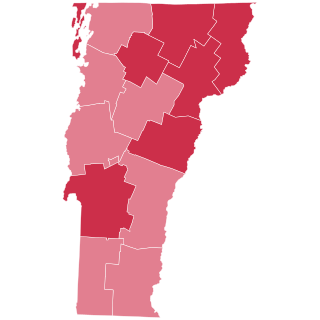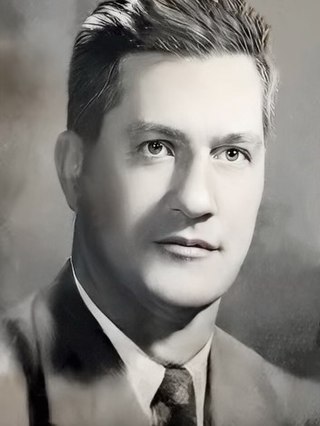The Vermont Progressive Party, formerly the Progressive Coalition and Independent Coalition, is a political party in the United States that is active in Vermont. It is the third-largest political party in Vermont behind the Democratic and Republican parties. As of 2023, the party has one member in the Vermont Senate and five members in the Vermont House of Representatives, as well as several more affiliated legislators who caucus with the Democratic Party.

Bernard Joseph Leddy was a United States district judge of the United States District Court for the District of Vermont.

Levi Underwood was a lawyer and politician from Vermont. Originally a Democrat, Underwood's antislavery views caused him to join the new Republican Party when it was founded. Underwood was most notable for his service as the 23rd lieutenant governor of Vermont from 1860 to 1862.

The 1984 United States presidential election in Vermont took place on November 6, 1984, as part of the 1984 United States presidential election, which was held throughout all 50 states and D.C. Voters chose three representatives, or electors to the Electoral College, who voted for president and vice president.
Louis Provost Peck was a Vermont attorney and public official. He is notable for his service as an associate justice of the Vermont Supreme Court from 1981 to 1990.

Rufus Everson Brown was a Vermont attorney, farmer and politician. He served as Vermont Attorney General from 1912 to 1915.

Frank Elliott Barber Jr. was a Vermont attorney and politician who served as Vermont Attorney General from 1953 to 1955.
William Weston was an attorney and politician in Burlington, Vermont, and Brooklyn, New York. He served in several local and state offices, and is most notable for his service as a member of the Vermont Senate in the 1850s.

Lakeview Cemetery is a historic rural cemetery located off of North Avenue in Burlington, Chittenden County, Vermont. The cemetery was created in 1867 and dedicated in 1871, and overlooks Lake Champlain. It is near the current campus of Burlington High School.

Daniel Chipman Linsley was an engineer, businessman, author, and political figure from Vermont. He was most notable for his railroad work which included serving as chief engineer of the Central Vermont Railway and assistant chief engineer of the Northern Pacific Railroad. Linsley was also active in politics and government in his hometown of Burlington, Vermont, and briefly served as Burlington's mayor in 1870.
Heman Lowry was a county, state and federal government official in Vermont. He was a delegate to two state constitutional conventions. Lowry was also the longtime sheriff of Chittenden County. In addition, he served twice as U.S. Marshal for Vermont.
Luther C. Dodge was a businessman, politician, and government official who was active in Vermont and California. A Republican, he was most notable for serving as mayor of Burlington, Vermont from 1871 to 1874.
Calvin H. Blodgett was a businessman and politician from Burlington, Vermont. A Democrat, he served as a member of Burlington's board of aldermen and was the city's mayor from 1874 to 1876.

The 1867 Vermont gubernatorial election took place on September 3, 1867. In keeping with the "Mountain Rule", incumbent Republican Paul Dillingham was not a candidate for another term as governor of Vermont. The Republican nomination was won by John B. Page, who had previously served as Vermont State Treasurer. The Democratic nomination was won by John L. Edwards of Newport, who had previously served as State's Attorney of Orleans County. In the general election, Page was elected to a one-year term as governor.

George H. Morse was businessman and local government official in Burlington, Vermont. A Republican, he served as mayor of Burlington from 1883 to 1885.

William A. Crombie was a businessman and local government official in Burlington, Vermont. A Republican, among the offices in which he served was mayor of Burlington (1889-1891).

The 1854 Vermont gubernatorial election for governor of Vermont took place on September 5. The Whig nominee was Stephen Royce, former Chief Justice of the Vermont Supreme Court. The Democratic nominee was Merritt Clark, and Lawrence Brainerd ran as the nominee of the Free Soil Party even as he was one of the organizers of the new anti-slavery Republican Party and appeared as a Whig candidate for the Vermont Senate on the ballot in Franklin County. Whig William C. Kittredge was nominated for governor against his wishes by advocates of the Temperance movement and Democrat Horatio Needham also attracted the support of some Free Soil advocates.

The 1815 Vermont gubernatorial election for Governor of Vermont took place in September and October, and resulted in the election of Jonas Galusha to a one-year term.

Earle B. McLaughlin was a career law enforcement officer from Vermont. A veteran of World War II, he was most notable for his service as Sheriff of Chittenden County, Vermont, from 1955 to 1977 and United States Marshal for Vermont from 1977 to 1982.

Daniel Roberts was an American attorney and politician from Vermont. Involved in the Abolitionist movement as well as reform causes including Temperance, he was active in the Liberty, Free Soil, and Democratic parties before becoming identified with the Republican Party when it was founded in the mid-1850s as America's main antislavery party.














